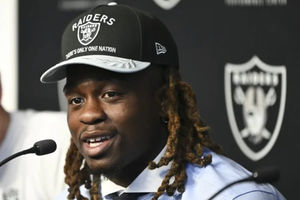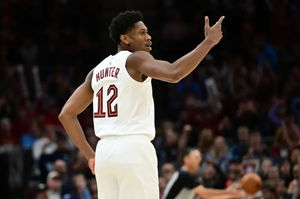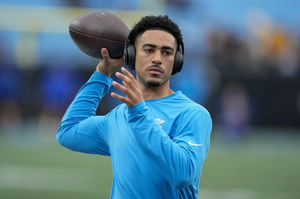College QBs Are Unprepared For The NFL

The on what some NFL coaches and executives consider a “crisis” over the future of the quarterback position: an increasing number of prospects, nurtured within the uptempo and spread offenses that are sweeping college football, who enter the league wholly unprepared for even the basics of running an NFL offense.
Detroit Lions offensive coordinator Joe Lombardi said the new crop of college quarterbacks were flummoxed by a simple question about an “under” front, one of the most common defensive alignments. “Whoa, no one’s ever told me ‘front’ before,” he remembers one prospect saying. “No one’s ever talked to me about reading these defenses.”
Buffalo Bills general manager Doug Whaley said he had the same results when he asked prospects a question about defenses shifting from a common scheme called “cover 2” to an equally mundane tactic called “cover 3.” Hue Jackson, the offensive coordinator from the Bengals, said he had to dumb down his questions, while Indianapolis Colts offensive coordinator Pep Hamilton said some QBs failed to grasp things as basic as understanding a common play call. “You have to teach these kids the absolute basics,” he said.
It’s an inevitable result of the disconnect between the game at the pro and college levels, and a reminder of the fact that the purpose of college is to win, not to prepare players for the NFL.
That means college teams taking advantage of inferior-quality defenses by running them ragged with no-huddles, or spread or option schemes that can thrive at the amateur level but haven’t been proven to work consistently in the pros. And that leads to athletic QBs who require an entire reeducation at their position once they’re drafted—with no guarantee that their skills or stats will translate, or even that desperately bad teams will have the patience to let them learn.
The knowledge base was so low, Buffalo’s Whaley said, that it left him feeling “a little nervous about the long-term future of this game.”
The NFL will be fine, though this trend promises to have significant impact at a time the league is historically pass-heavy. But it will change, either organically or through the forward-thinking actions of teams able to successfully adapt before their contemporaries do. How’ll it happen? I can think of four possibilities, and the most likely answer is a gradual evolution that combines a few of them.
1. The most sweeping and appropriate answer would be for the NFL to start its own minor league, with the foremost goal being to prepare prospects to succeed in the big show. This will almost certainly never happen: though the existence of the college game isn’t ideal by NFL standards, it’s free.
2. Teams could give young quarterbacks more leeway to learn the offense. In the , Jets QB Bryce Petty is refreshingly up-front about how little he knew about reading defenses from his time in Baylor’s spread offense. But he thinks teams made the mistake of believing he was incapable of ever learning. “I’m like ‘you’ve got to give me a chance a little bit.’”
In a more logical NFL, rookie quarterbacks would not be expected to contribute. They could sit and practice and learn, perhaps for a couple of years, until they’re ready to step in. With things as they are, this is probably not feasible. Roster spots are too valuable, and rookie deals last four years so teams won’t be keen on wasting any of that cheap team control. And it’s the coaches and front offices with the worst records and therefore the top picks who are the most desperate to put their shiny new signal-callers on display, to keep fans interested and to save their own jobs.
3. If pro offenses were more like college offenses, the learning curve wouldn’t be nearly as steep. Some of the most exciting quarterbacks to enter the NFL, like Tim Tebow and Robert Griffin III, are legitimate talents. But those talents don’t translate, or are overshadowed by their deficiencies. The two struggle with going through their progressions and with defenses that disguise their coverage, and NFL defensive players are too fast and strong for the QBs to escape trouble with their legs, like they were accustomed to doing in college. One solution would be for teams to increasingly incorporate aspects of college offenses to maximize the talents the QBs do offer; Bears OC Adam Gase identifies Chip Kelly as a coach who’s doing exactly that.
4. Somewhere out there is a Holy Grail of offenses, some scheme to revolutionize (and minimize) the role of the quarterback. Rams GM Les Snead likens it to the Cover 2 defense, which utilized safety help to make it so cornerbacks rarely needed to cover receivers one-on-one. Shutdown corners still matter, but teams can get by without them. What if there were a way to make quarterbacks, by far the most valuable and least replaceable position, that much less valuable to the operation of an offense?
Browns GM Ray Farmer has thought it over.
Cleveland’s Farmer has one idea: What if you could design an offense to minimize the passing deficiencies of modern quarterback prospects? Farmer used the example of Auburn’s Nick Marshall, who threw 20 touchdowns last season but was projected to transition to defensive back in the NFL. What if, Farmer said, you devoted resources to designing an offense where Marshall could thrive? He would cost you almost nothing—Marshall went undrafted—and “you might get your franchise quarterback in the later rounds, and that’s unheard of these days.”
“Whoever cracks this code the soonest is going to have a huge, huge advantage,” Farmer said, adding he and his coach, Pettine, have had broad discussions on the topic.
That’s easy to say, but the obvious question here is: what would this offense look like? What football philosophy could be so revolutionary to relegate the quarterback position back to the importance it had before the forward pass, or at least to make it so any old dude could slot into an elite offense without missing a beat?
NFL teams clearly don’t have that answer yet. And I have no idea either. If I didn’t, I wouldn’t be blogging this, I’d be off getting rich and famous on a sideline somewhere.
Why the NFL Has a Quarterback Crisis [Wall Street Journal]
Related
How Gary Bettman Built the Model MLB Owners Crave
UFC 325 Betting Preview: Three Bet Picks for Saturday Night
- Wednesday Jan. 28 NBA Best Betting Picks, Predictions
- Rangers vs Islanders Jan. 28 NHL Betting Pick and Predictions
- College Basketball Picks Today: Nebraska vs. Michigan Headlines Loaded Slate
- Tuesday NHL Betting Picks: Expert Bets for Jan. 27th
- Best NBA Bets Today: Spread Picks and Player Props for Monday’s Games
- NFL Championship Weekend Picks: AFC & NFC Best Bets
- College Basketball Player Prop Bet Picks for Saturday, January 24th












